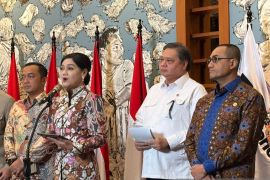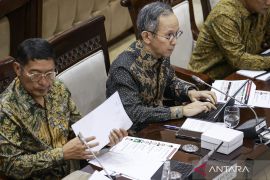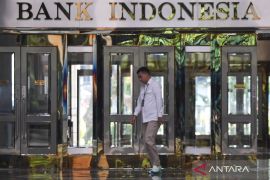... real imports had also slowed but could not balance the contraction in real exports so that it could not improve net export performance... "Jakarta (ANTARA News) - Bank Indonesia (BI) revised down its prediction of economic growth in 2014, from its initial 5.5-5.9 percent to 5.1-5.5 percent.
"The factor that had made us revise the economic growth target down is the revision of export performance," BI governor Agus Martowardojo said at a press conference here on Thursday.
He said initially BI predicted that real exports (goods and services) would grow 8.1- 8.5 percent but in reality in the first quarter the growth of real exports was lower between 1.5 percent and 1.9 percent.
"The drop in the real exports was caused by three factors, namely slow domestic demand, low price of export commodities and impact of the implementation of the law on minerals and coal," he said.
Based on Bank Indonesia's assessment, global economic recovery is still continuing. Improvement in global economic conditions is primarily driven by economic conditions in advanced countries, such as the United States and Europe, as the impact of the monetary stimulus is still continuing. The improvement in the global economic conditions had led to an increase in the volume of world trade, he explained.
"However, China's growth had slowed after it implemented a policy to balance its economy. The price of commodities also tended to decline, especially that of rubber, copper and coal," he said.
In the future, he said, Bank Indonesia will continue monitoring different risks from global economic development, especially those that come from normalization of the Federal policy and China's slow economic growth.
Indonesia's economy in the first quarter slowed due to contraction of real exports. The country's economy grew 5.21 percent in the first quarter year-on-year, down from 5.72 percent in the fourth quarter of 2013 and from Bank Indonesia's initial forecast.
The contraction of real exports was mainly caused by a decline in mining exports, such as coal and mineral concentrate among others, due to weak demand, especially from China, and a price drop and the temporary impact of the ban on raw mineral exports.
The slow consumption by the government, meanwhile, had also contributed to the slowing down of the economic growth.
Household consumption and investment, however, still grew and bolstered economic growth in the first quarter of 2014.
Household consumption growth was boosted by consumers' confidence that remained strong and the impact of the legislative election on April 9.
Investments had also increased marginally driven by non-construction investments that grew, especially machinery investments, while construction investment had slowed down.
"In line with the moderation of domestic demand, real imports had also slowed but could not balance the contraction in real exports so that it could not improve net export performance," he said.
Editor: Ade P Marboen
Copyright © ANTARA 2014











